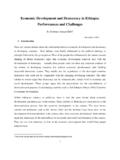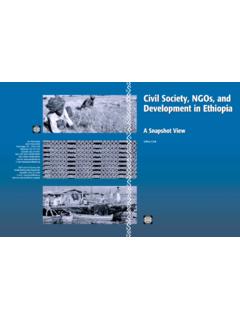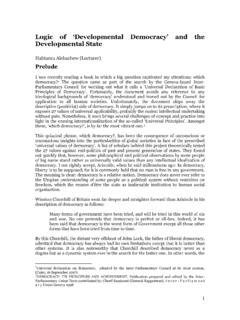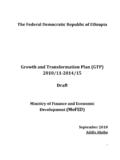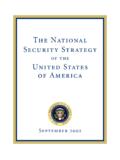Transcription of Refugees, Migration, and Gated Nations: The Eritrean ...
1 Refugees, Migration, and Gated Nations: The Eritrean ExperienceDan ConnellAfrican Studies Review, Volume 59, Number 3, December 2016, pp. 217-225(Article)Published by Cambridge University PressFor additional information about this articleAccess provided by Smith College Libraries (24 Jan 2017 18:03 GMT) , Migration, and Gated Nations: The Eritrean ExperienceDan ConnellSaid Ibrahim, aged twenty-one, orphaned and blind, was making a living as a singer in Adi Quala bars when a member of Eritrea s national secu-rity force claimed that one of his songs had political content and detained him at the notorious Adi Abieto prison (interview, Adi Harush Camp, ethiopia , May 30, 2012).
2 After a month Said was released, but he was stripped of his disability payments for two years when he refused to identity the lyricist. I went back to my village and reflected about it, he told me over tea at an open-air caf in the Adi Harush refugee camp in ethiopia four years ago. If the system could do this to a blind orphan, something was very wrong. After appealing to his neighbors for help, two boys, aged ten and eleven, sneaked him into ethiopia and all three asked for Beyene, aged thirty-five, was pregnant with her second child when she was sent to a desert prison in northern Eritrea for attending a banned Pentecostal prayer meeting (interview, Mai Aini Camp, ethiopia , May 28, 2012).
3 Upon release, she was given ten months to renounce her faith and pressed to do so by the local Eritrean Orthodox priest, who had turned her in in the first place, and by her family, who had to guarantee the state EN50,000 to get her out ( $3,300 at the official exchange rate). Four months later, she paid a smuggler EN30,000 to take her to ethiopia . The dark side of my life was not the year in prison, but the time I spent at home with my family, she said as she sat on the dirt floor of her cramped mud-brick house. It was a torment I could not bear. African Studies Review, Volume 59, Number 3 (December 2016), pp.
4 217 225 Dan Connell is a visiting researcher at Boston University s African Studies Center. He has written numerous books and articles on Eritrea and currently is writing a book on the refugee crisis. E-mail: African Studies Association, 2016 African Studies ReviewThe newcomers joined more than sixty-five thousand Eritreans housed in five camps along the tense border with ethiopia that year, a border whose disputed location was the spark that set off a fierce fight between the two countries a decade earlier and remains both a source of potential conflict and Eritrea s rationale for keeping the younger generation in the army indefi-nitely today.
5 It is also the reason the government gives for prohibiting nearly every organization or activity it doesn t directly control, from political parties and NGOs to private prayer meetings and protest their small northeast African country, about the size of Pennsylvania with a population of about four million, is one of the largest per capita producers of asylum seekers in the world (UNHCR 2015a). Many languish in desert camps. Some have been kidnapped, tortured, and ransomed or killed in the Sinai (Connell 2013a; Van Reisen 2012, 2013). Others have been left to die in the Sahara or drowned in the Mediterranean.
6 Eritreans in South Africa have been brutally attacked in paroxysms of xenophobic violence; some in Israel have been firebombed or beaten by ultranationalists. Some trying to reach the United States and Canada have been refused entry under post-9/11 terrorism bars based on past association with an armed movement the very one they are now I returned to the camps in ethiopia in March 2016 for the fourth time in as many years, the number of Eritrean refugees in the country had swollen to nearly 155,000, according to the Refugee Agency (UNHCR), though so many had moved on to other destinations or died trying that these statistics didn t begin to reflect the magnitude of the exodus (ReliefWeb2016).
7 By this time, many I had met in 2012 were no longer there, gone instead to Libya to try to reach Europe. A growing number of the new-est arrivals were just kids. A whole generation appeared to be on the the course of these four years, I ve traveled to nineteen countries on five continents to dig deeper into who the refugees are, why they fled, how they got out, and what they experienced on their journeys, interview-ing more than five hundred in lengthy private sessions that I recorded and A remarkable number manage to survive and carve out new lives, but some scrape by in low-wage jobs and others live off handouts from family members, while many thousands are stuck in limbo, lacking legal status and unable to marshal the resources or the stamina to keep moving.
8 Among the worst off are those marooned in Djibouti s remote desert ref-ugee camps, which for many is a cul-de-sac with no way out. And there are the thirty thousand stuck in Israel, where they are classified as infiltrators, not refugees, and are under pressure to either self-deport or face deten-tion, a devil s choice made all the more difficult by the expectations of safety and solidarity they d had when they arrived (Connell 2013b).The most horrifying of their misfortunes the kidnapping, torture, and ransoming in the Sinai has generated attention in the media and among human rights organizations, as have several tragic shipwrecks in the Mediterranean that claimed five hundred lives or more at a time.
9 Commentary: Eritrean Refugees 219 But the public response, like that to natural disasters, tends to be ephemeral, turning the refugees into objects of pity or charity with little grasp of who they are, why they take such risks, or what can be done to halt the hemorrhaging. This is abetted by the Eritrea government, which masks the political origins of these flows by insisting they are migrants, not refugees, and no different from those of other poor countries like their neighbor and archenemy, ethiopia . It is a fiction that s convenient for destination countries struggling with rising ultranationalist movements and eager for a rationale for turning the Eritreans (and others) They FleeEritrea has been the scene of conquest, conflict, resistance, and repression for more than a century colonized by Italy in the 1890s, occupied Britain in the 1940s, and then annexed by ethiopia in the 1950s, against which it fought a thirty-year war for independence.
10 That struggle pitted Eritreans against successive and Soviet-backed regimes even as the nationalist movement fractured into warring factions until one army, the Eritrean People s Liberation Front, came out on top and defeated the Ethiopians. Statehood and internal recognition came after a referen-dum in 1993, but within five years the new nation had fought with all its neighbors, including most recently ethiopia . A 1998 2000 border war claimed more than one hundred thousand lives on both sides before a truce was reached, but the basic dispute remains unresolved. An interna-tional commission rendered a decision in 2002 that both sides had agreed would be final and binding, but ethiopia has declined to implement it without further negotiations and Eritrea refuses to talk.
